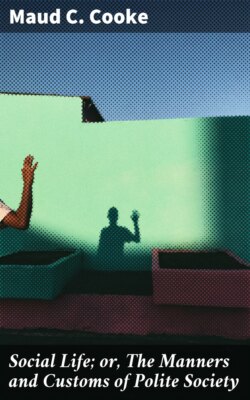Читать книгу Social Life; or, The Manners and Customs of Polite Society - Maud C. Cooke - Страница 83
На сайте Литреса книга снята с продажи.
The Reception-Room.
ОглавлениеTable of Contents
The arrangement of the reception-room itself has much to do with the pleasure of the visitor. Who does not remember those delightful parlors where the guests dropped into pleasant conversational groups as by magic, and contrast them mentally with those other chilly apartments where a sort of mental frost seems to settle over one's faculties and incapacitate them for use. Much of this may be avoided by a judicious arrangement of chairs and couches, just where people drop naturally into easy groups, or, for the time being, surround their hostess.
Propinquity is a great incentive to pleasant conversation, for there are few people that can talk the pretty nothings and sparkling witticisms, whereof parlor conversation properly consists, across space to people stranded against the opposite wall. Therefore let the hostess, who would have her symposiums remembered with delight, see to it that she has an abundance of chairs, both easy and light, easy ones for the refreshment of the weary in body and light ones that may be quickly moved when the spirit moves toward some other group.
A clever woman, to whom all social arts were long-solved problems, once said that she always observed how the chairs were left in a drawing room where several people had been sitting and put them in the same position next time. A group near the door where the casual caller will naturally drop into one and the hostess into another, without the least effort, will be placed in the best possible position for a little chat. Fulfill these conditions and your drawing room will be often filled and the fame of it will go abroad.
Formal calls, as a rule, are at best but a duty performed that brings a satisfaction in itself, but it sometimes happens that, as a reward for our well-doing, some word may be said, some friend may be met by a happy chance that is like a gleam of sunshine on a cloudy day.
THERE are certain rules to be observed in the writing of invitations that cannot be transgressed without incurring a just suspicion as to the degree of one's acquaintance with the laws and canons that govern our best society. For instance, Mrs. John Doe issues invitations for a ball or evening party; these, if issued in her own name or in the name of herself and daughter, or lady friend, would, very properly, find them "at home" on a certain evening. Should, however, the invitations be sent out in the name of herself and husband, then it is that "Mr. and Mrs. John Doe request the pleasure of Mr. and Mrs. Richard Roe's company" at a certain date. We will also find that Mr. Dick Roe is never "at home," but "requests the pleasure of your company."
To widely depart from any of these received canons of etiquette is to commit a decided solecism and to discover an utter unfitness for the desired social rank. Fortunately, there is no need, even for those not to the manor born, of displaying any ignorance in this matter when the simple consultation of a standard work on social etiquette will give the needed information and save the credit of the individual.
At first sight, it would seem a very easy thing to invite a friend to come to you at a given day and hour, and to accept or decline said invitation would appear a matter scarcely worth considering. This rash conclusion, however, disappears from view when it is recollected that the proper phrasing, the suitable signature, and the appropriate paper, are all matters of the nicest choice, and indicate with the most unerring accuracy the good or ill breeding of the parties interested.
From two to three persons only are invited from one family to the same entertainment, and, in the event of a small dinner party, two would be the limit. The invitations would be addressed, not to Mr. Coates and family, but one to "Mr. and Mrs. Coates," another to "The Misses Coates," or to "Miss Coates." If there are brothers, and they are to be invited, a separate invitation is required for each one of them; a single one addressed to the "Messrs. Coates" being considered in bad taste. To one son and one daughter a joint invitation may be extended in the name of "Miss Coates and Brother." On rather informal occasions where the family, and perhaps their guests also, are desired to be present, the invitation may be sent in the name of "Mr. and Mrs. James B. Coates and Party."
